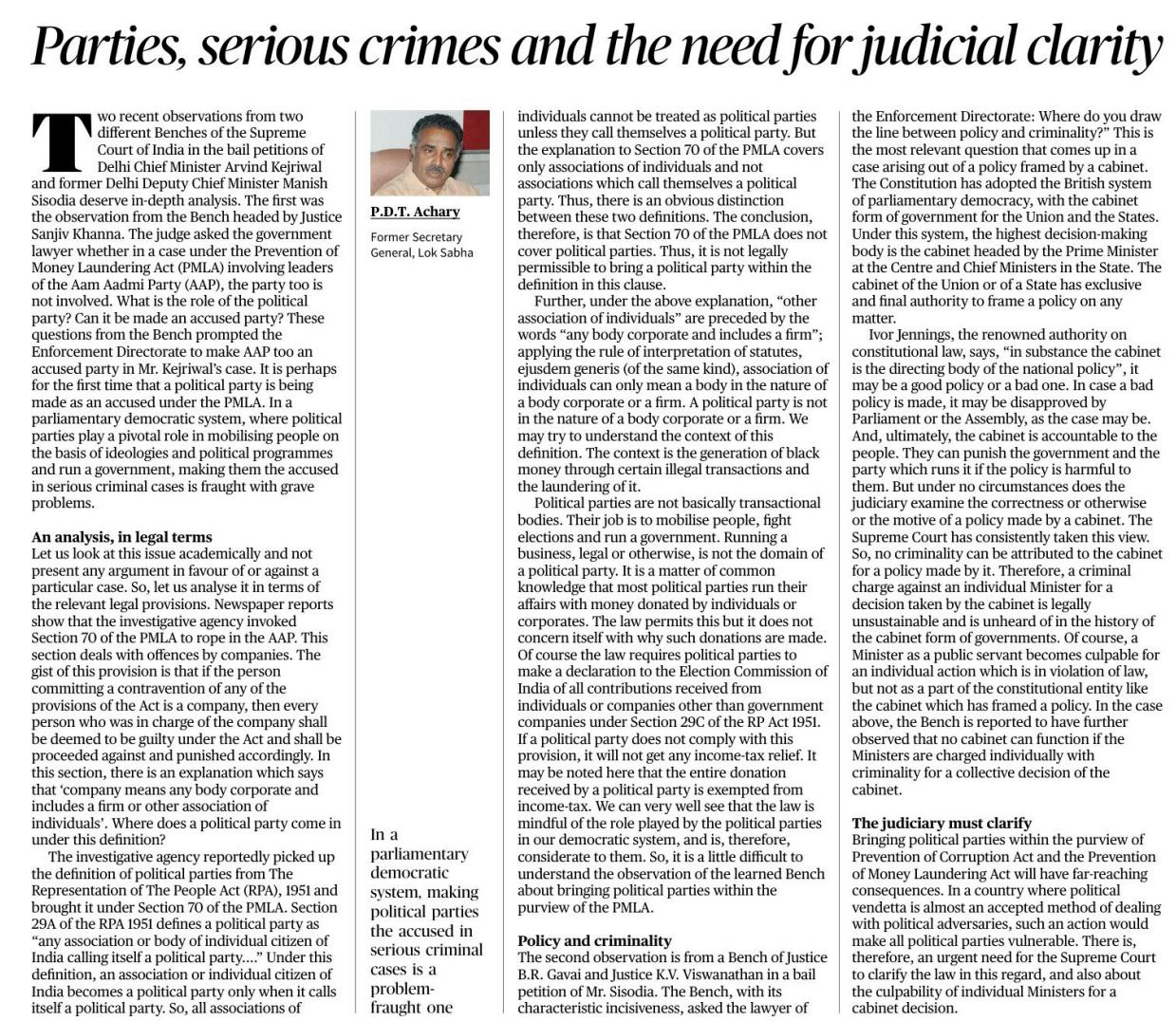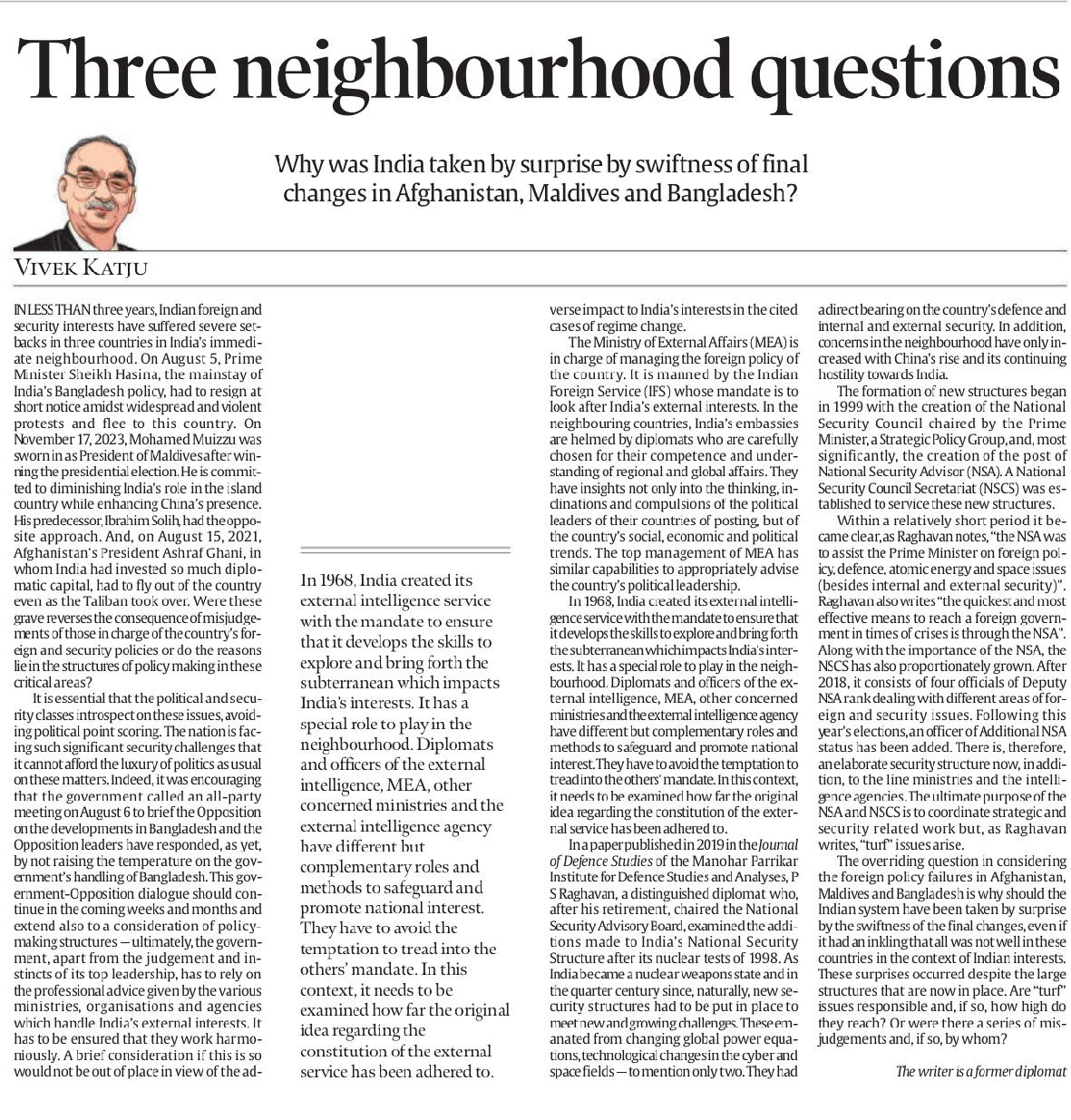Political parties and criminal proceedings
Introduction:
Recent Supreme Court observations have raised complex legal issues concerning the involvement of political parties in serious criminal cases and the individual accountability of ministers for collective cabinet decisions. These observations came during the bail petitions of Delhi Chief Minister Arvind Kejriwal and former Deputy Chief Minister Manish Sisodia.
Key Issues:
- Involvement of Political Parties under PMLA:
- Supreme Court Observation: Justice Sanjiv Khanna’s Bench questioned whether a political party could be implicated under the Prevention of Money Laundering Act (PMLA). This led the Enforcement Directorate to list the Aam Aadmi Party (AAP) as an accused in Kejriwal’s case, a first in PMLA history.
- Legal Analysis:
- Section 70 of PMLA: This section pertains to offenses by companies and is applied to bodies corporate, including firms and associations of individuals. It does not explicitly include political parties, which are defined differently under The Representation of the People Act (RPA) 1951.
- Distinction in Definitions: The RPA defines a political party as any association calling itself a political party. The explanation under Section 70 of PMLA refers to associations of individuals similar to bodies corporate or firms, not explicitly including political parties.
- Implications: If political parties are not explicitly included in Section 70, their inclusion under PMLA raises legal concerns. The current legal framework suggests that political parties might not be appropriately covered under this section.
- Judicial Perspective on Ministerial Accountability:
- Supreme Court Observation: Justice B.R. Gavai and Justice K.V. Viswanathan highlighted that individual ministers should not be held criminally accountable for collective cabinet decisions. This observation underscores the constitutional principle that cabinets, not individual ministers, are responsible for policy decisions.
- Legal Context:
- Cabinet Responsibility: In the parliamentary system, the cabinet collectively makes policy decisions, and individual ministers are accountable for their actions in office but not for collective cabinet decisions.
- Judicial Precedents: The Supreme Court has traditionally held that criminal charges against individual ministers for collective cabinet decisions are legally unsustainable. The focus should be on individual wrongdoing rather than collective policy-making.
Implications:
- Political Parties as Accused:
- Legal Risks: Including political parties under PMLA could set a precedent with far-reaching consequences. Political parties, primarily engaged in mobilizing and governing rather than transactional business activities, may not fit within the intended scope of PMLA.
- Political Vendetta: The risk of misuse of such provisions for political purposes is significant. The legal system must be cautious to avoid politicizing legal proceedings.
- Individual Accountability for Cabinet Decisions:
- Cabinet Functioning: Holding individual ministers criminally liable for decisions made collectively by the cabinet could paralyze governance and undermine the functioning of democratic institutions.
- Judicial Clarity Needed: There is an urgent need for judicial clarification on the limits of individual accountability in the context of collective policy decisions.
Conclusion:
The Supreme Court’s recent observations highlight critical legal and constitutional issues regarding the treatment of political parties under anti-money laundering laws and the accountability of individual ministers for cabinet decisions.
Clarity from the judiciary is essential to navigate these complex issues, ensuring that legal frameworks are applied appropriately without compromising democratic governance and political stability.
Practice Question:
|
Analysis of India's Response to Neighbourhood Changes
Introduction
In recent years, India has faced significant diplomatic and strategic setbacks in its immediate neighbourhood, particularly in Afghanistan, the Maldives, and Bangladesh.
The rapid and unforeseen changes in these countries have led to questions about the effectiveness of India’s foreign and security policy apparatus.
Analysis
- Overview of Setbacks
- Afghanistan: On August 15, 2021, Afghanistan fell to the Taliban, leading to the abrupt departure of President Ashraf Ghani. India, which had invested considerable diplomatic and developmental capital in Afghanistan, was caught off guard by the rapidity of the Taliban’s takeover.
- Maldives: The election of Mohamed Muizzu as President on November 17, 2023, marked a significant shift in Maldivian foreign policy. Muizzu’s commitment to reducing India’s influence while increasing China’s presence contrasted sharply with his predecessor Ibrahim Solih’s pro-India stance.
- Bangladesh: Prime Minister Sheikh Hasina, a key ally for India in Bangladesh, faced unexpected political turmoil and was compelled to resign and flee on August 5, 2024. This sudden upheaval destabilized the long-standing cooperative relationship between India and Bangladesh.
- Possible Causes of Surprise
- Misjudgements: One possibility is that India’s foreign and security policy makers misjudged the political stability in these countries.
In Afghanistan, for instance, there may have been overconfidence in the Afghan government’s ability to resist the Taliban.
Similarly, in the Maldives and Bangladesh, the rapid changes could indicate a failure to anticipate shifts in domestic politics and their potential impact on India’s strategic interests.
- Structural Inefficiencies: Another explanation could be structural inefficiencies within India’s policy-making institutions.
The creation of the National Security Council (NSC) and the post of National Security Advisor (NSA) in 1999 aimed to enhance strategic coordination.
However, issues such as turf wars between the Ministry of External Affairs (MEA), intelligence agencies, and the NSA could have hampered effective policy responses.
- The Role of Institutions
- Ministry of External Affairs (MEA): The MEA, staffed by the Indian Foreign Service (IFS), is responsible for managing India’s foreign relations.
Despite its expertise and capability, the MEA’s effectiveness might be diminished by lack of real-time intelligence or by delays in communication with other security agencies.
- External Intelligence Agency: Established in 1968, India’s external intelligence agency was designed to provide in-depth analysis and early warnings about threats.
Its role is critical in understanding subterranean political movements and potential threats. However, if its insights are not effectively integrated into policy decisions, surprises in neighbouring countries are likely.
- National Security Advisor (NSA) and NSCS: The NSA and the National Security Council Secretariat (NSCS) are meant to coordinate strategic and security-related work.
Despite their role in overseeing and integrating various aspects of national security, turf issues and bureaucratic delays could lead to gaps in policy formulation and execution.
- Solutions and Recommendations
- Enhanced Coordination: There needs to be better coordination between the MEA, intelligence agencies, and the NSA. Establishing clearer protocols for information sharing and decision-making can help ensure a more integrated response to emerging threats and developments.
- Strengthening Intelligence Capabilities: Investing in more robust intelligence gathering and analysis capabilities, particularly in volatile regions, can provide early warnings and improve preparedness.
- Regular Policy Reviews: Conducting regular reviews and simulations of potential scenarios in the neighbourhood can help anticipate possible changes and prepare appropriate responses.
- Bipartisan Cooperation: Encouraging bipartisan cooperation on foreign policy issues can ensure more stable and coherent policy decisions, reducing the impact of domestic political changes on international relations.
Conclusion
India’s recent experiences with rapid political changes in Afghanistan, the Maldives, and Bangladesh underscore the need for a more effective and coordinated foreign and security policy framework. While misjudgements may have contributed to these setbacks, structural inefficiencies and coordination issues within India’s policy-making institutions also played a significant role. By addressing these issues and enhancing its strategic capabilities, India can better navigate future challenges and protect its interests in the region.
Practice Question Question:
|
Rule and Exception: Ensuring Fair Trial and the Right to Bail
The principle of bail is foundational to the justice system, embodying the presumption of innocence until proven guilty.
Recent Supreme Court rulings, including the bail granted to Delhi Deputy Chief Minister Manish Sisodia, highlight the importance of adhering to these principles and ensuring that prolonged pre-trial detention does not become a tool of punishment.
Analysis
- Fundamental Principles of Bail
- Presumption of Innocence: Bail is grounded in the principle that a person is considered innocent until proven guilty. The right to bail is an essential safeguard against arbitrary detention and ensures that individuals are not punished before a court has determined their guilt.
- Criteria for Granting Bail: The basic criteria for granting bail include:
- Nature of Evidence: When a case predominantly relies on documentary evidence, bail is generally granted, barring exceptional circumstances.
- Flight Risk and Witness Tampering: Bail may be denied if there is a risk that the suspect will flee or interfere with evidence and witnesses.
- Delay in Trial: Prolonged delays in trial proceedings can be a valid ground for granting bail, as excessive pre-trial detention can be seen as a form of punishment.
- Recent Developments: The Case of Manish Sisodia
- Sisodia’s Detention: Manish Sisodia’s detention under the Prevention of Money Laundering Act (PMLA) for nearly a year and a half highlights the challenges in ensuring timely justice. Despite the Supreme Court’s intervention to grant bail, delays in the trial process have extended his pre-trial imprisonment.
- Judicial Tendencies: The Supreme Court’s order underscores a critical issue in the judicial system—the tendency of some judges to prioritize caution over fairness, leading to prolonged detention. The Court’s directive to allow bail if the trial does not progress within a reasonable timeframe aims to counteract this tendency.
- Implications of Prolonged Pre-Trial Detention
- Impact on Public Trust: Extended pre-trial detention can erode public trust in the judicial system. It may be perceived as a form of punishment rather than a measure of ensuring trial attendance or protecting the integrity of evidence.
- Fair Trial Rights: The right to a fair trial includes timely adjudication. Delays in the trial process can compromise this right, making it essential for courts to address prolonged detention and ensure that it does not become a means of pre-emptive punishment.
- Recommendations for Ensuring Fairness
- Streamlining Judicial Processes: Courts and investigative agencies should work to expedite trial processes, ensuring that delays are minimized and justice is delivered in a timely manner.
- Judicial Vigilance: Judges should be vigilant against the misuse of pre-trial detention. Ensuring that bail is granted in accordance with established principles and monitoring delays in the trial process are crucial steps in maintaining fairness.
- Legislative and Administrative Reforms: Consideration of reforms to expedite trials and address the issues associated with prolonged pre-trial detention could help in aligning judicial practices with the principles of fairness and justice.
Conclusion
The Supreme Court’s intervention in the case of Manish Sisodia underscores the need for adherence to the fundamental principles of bail and fair trial.
Prolonged pre-trial detention, as observed in recent cases, challenges the presumption of innocence and can erode public trust in the judicial system.
By addressing delays and ensuring that bail is granted in accordance with established legal principles, the judiciary can uphold the integrity of the justice system and protect the rights of individuals.




